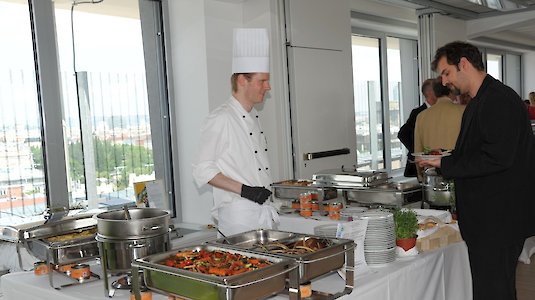Less is more – 45.000 tons of food ends up in the garbage!
At events, the participants enjoy a rich buffet. So that nothing edible goes into the garbage afterwards, good planning is essential.
Planning against waste - every year 45,000 t of food ends up in garbage
A study by the University of Natural Resources for the United Against Waste initiative revealed that around 45,000 tonnes of avoidable food waste in the catering industry occur in Austria each year. The eco-label is here for counter acts: Green Meetings and Green Events are about the responsible use of resources. This includes sustainable products for the guests as well as the avoidance of food waste. "The catering should be calculated and organized in such a way as to avoid food waste", explains Barbara Dusek, responsible for Green Meetings at the Ecolabel.
Some measures can help event organizers avoid or minimize food waste: a good estimate of the number of guests and the amount of consume is the most important thing. If the event is associated with a registration, it should be asked if the people would participate at the meal. Also, the reference to a deregistration option for short-term cancellations enables better planning, as well as cooling options there.
To pack in food leftovers is "in"
Containers where the hosts and guests can take the food can be provided. For bigger events, the “Tafelbox” of the Wiener Tafel is the right choice. There is also the possibility of having leftover food collected by food saver: these help on a voluntary basis to avoid food waste. They pick up the food and distribute it to clubs and social projects or provide information about availability online. The United against Waste initiative helps kitchens to avoid food waste.
Guests can also be involved in food waste prevention strategies. A buffet, which bends in front of Essensbergen, entices hungry guests to load themselves too much on the plate. Here can a buffet be prevented, which is constantly refilled, but there are also smaller plates. Recently, even the Knigge recommends as a new rule of manners, to be packaged in the catering food - this can be prompt well-visible takeaway boxes and possibly a reference to the buffet table. Individual manufacturers already offer boxes of renewable raw materials.
"A criterion at Green Meetings is that participants or employees may take other food," adds Dusek. "Leftover food will be donated to local welfare or the needy wherever possible. This procedure should be communicate to the participants before or during the event. "As an example Dusek mentions an event of the University of Natural Resources and Applied Life Sciences in Vienna:" The BOKU provided board boxes to save leftover food from destruction while supporting social transfer. At the end of the event, guests, employees and students of the BOKU were invited to pack the leftover food independently and on their own responsibility and to take it home. "In this way food is saved from pointless waste and from garbage.
